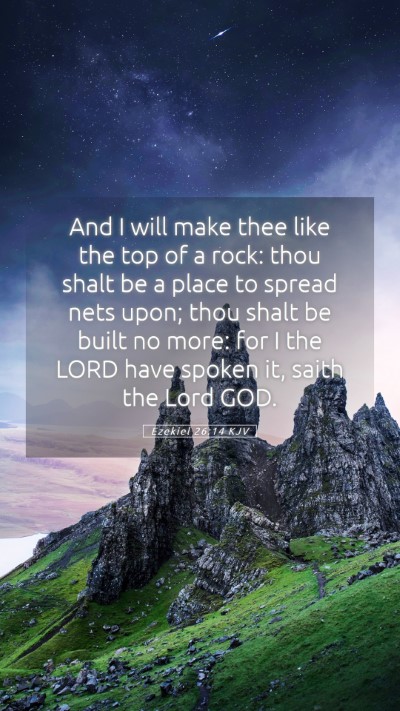Ezekiel 26:14 Commentary and Interpretation
Verse: "And I will make you like a bare rock, you will be a place to spread nets upon; you will never be rebuilt. For I the Lord have spoken, declares the Sovereign Lord." - Ezekiel 26:14
This verse depicts God's judgment upon the city of Tyre, signifying complete devastation and desolation. The imagery of a "bare rock" suggests an utter lack of habitation while also implying that the site will become a fishing ground, uninhabited and stripped of its former glory.
Meaning and Insights from Commentaries
The interpretations of this verse bring light to God's sovereign authority over nations and the permanence of His decrees.
- Matthew Henry: Henry emphasizes the irrevocable nature of God's judgment on Tyre, indicating that it would never rise to its former power. The metaphor of spreading nets denotes that the location would become a mere site for fishermen, illustrating a shift from a place of prosperity to one of destitution.
- Albert Barnes: Barnes expands on the destruction of Tyre and its implications, suggesting that God’s judgment serves as a warning to others about the consequences of pride and rebellion against Him. He highlights that the city, once filled with commerce and power, would be left desolate and uninhabited, reinforcing the theme of divine retribution.
- Adam Clarke: Clarke focuses on the symbolic meaning of being a “bare rock,” implying a stark contrast to the city’s former glory as a bustling trade center. He underlines how Tyre's fall serves as a testament to the Lord’s power to humble even the mightiest of nations, leading to reflection on the importance of humility and obedience in our lives.
Historical Context
This judgment is rooted in the broader historical context of Tyre's pride and arrogance in relation to their wealth and power. Tyre had become known for its wealth and strategic trading position, but its leaders failed to recognize God's sovereignty.
The pronouncement of judgment in Ezekiel is part of a series of oracles against the nations surrounding Israel, emphasizing God's ultimate authority over all and the consequences of idolatry and pride.
Application and Significance
For modern readers, Ezekiel 26:14 serves as a powerful reminder of the nature of divine judgment. It challenges us to reflect on our own lives and the potential pitfalls of pride and self-reliance. The verse encourages humility and recognition of God's sovereignty in our daily lives.
Cross References
- Isaiah 23:1-18: Prophecy against Tyre, revealing similar themes of judgment.
- Jeremiah 25:22-23: Judgment against the nations, including Tyre.
- Ezekiel 28:20-26: Further judgment against the prince of Tyre, highlighting God's authority.
Conclusion
Understanding this verse provides deep insights into the themes of judgment, sovereignty, and the transience of human pride. As part of our Bible study resources, this verse can inspire Bible study groups to explore the nature of God's justice and mercy.
Through Bible studies, we can learn important lessons about the consequences of turning away from God, making it a relevant text for both ancient and contemporary applications.
In summary, Ezekiel 26:14 offers profound Bible verse interpretations that resonate through history and into our current spiritual understanding. Whether we are seeking Bible verse explanations or exploring Scripture analysis, the insights derived from public domain commentaries and the overarching message of the verse remain crucial for our Bible study insights.


